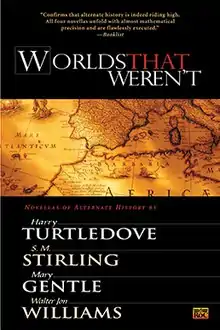Shikari in Galveston
Shikari in Galveston is an alternate history short story written by S. M. Stirling. It is a prequel to The Peshawar Lancers.[1]
| "Shikari in Galveston" | |
|---|---|
 | |
| Author | S. M. Stirling |
| Country | United States |
| Language | English |
| Genre(s) | alternate history, steampunk, post-apocalyptic fiction |
| Published in | Worlds That Weren't |
| Publication type | Anthology |
| Publisher | Roc Books |
| Media type | Print (Hardcover and Paperback) |
| Publication date | 2003 |
| Followed by | "The Peshawar Lancers" |
Plot summary
Shikari in Galveston takes place in Texas a century after a meteor shower devastated North America and Europe in 1878. The disaster led to the United States collapsing and later causing society in Texas to evolved into a mixture of Native American and European society. The British Empire, or the Angrezi Raj, has been expanding its influence into coastal North America, including Galveston, which is being used as a base.
British cavalry officer Eric King, is assembling a hunting party which includes the revenge seeking Sonjuh, who lost her family to the cannibals and Robre, a young hunter of the Cross Plains tribe who hopes to earn a rare rifle from King. Meanwhile, Russian agents plan to incite a tribe of cannibals to destroy the British allied tribes of former Texas.
"Why Then, There"
Accompanying Shikari in Galveston in Worlds That Weren't was an afterword by Stirling entitled Why Then, There. Stirling makes it clear that he uses alternate history to write adventure fiction in the tradition of Edgar Rice Burroughs and H. Rider Haggard, fiction that can no longer be set in the explored, post-colonial world.
Characters in "Shikari in Galveston"
The character Robre is inspired by Robert E. Howard.[2] In addition, the story as a whole can be seen as an answer to Howard's Conan story "Beyond the Black River". In Howard's story, a character concludes that barbarism must triumph over civilization, while in Stirling's "Shikari", Eric King states to Robre that civilization ultimately spreads and triumphs over barbarism.
Literary significance and reception
Rick Kleffel called the story "fascinating and thought-provoking" and described an action scene as a "reader's equivalent of a wild thrill sequence from great popcorn movie", but complained about the language making the story difficult to read.[3] Strange Horizons said the story "succeeds in delivering action-packed adventure and hair's-breadth escapes" but stated the story ended too soon and read more like a compact version of a novel.[4] Steven H Silver said that the story reads like a Haggard set in an unexplored African continent, but complained that Stirling focuses on the world and the technology rather than the characters.[5]
Publication history
Shikari in Galveston was originally published in 2003 in the alternate history anthology Worlds That Weren't which included stories by Harry Turtledove, Mary Gentle, and Walter John Williams.[4]
References
- http://www.uchronia.net/label/stirpeshaw.html#2
- Cynthia Ward (9 December 2002). "Worlds That Weren't: A Definitive Anthology of Alternate History?". Book Review. Strange Horizons. Retrieved 2008-10-03.
- Rick Kleffel (2002). "Worlds That Weren't Review". Agony Column. Retrieved 2008-10-03.
- "Gilman, Laura Anne (ed.). Worlds that Weren't". Uchronia. Retrieved 2008-10-03.
- Steven Silver. "WORLDS THAT WEREN'T". Book Review. SF Site. Retrieved 2008-10-03.
External links
- Worlds That Weren't on Google Books - includes Shikari in Galveston
- Sample section on author's website
- Shikari in Galveston title listing at the Internet Speculative Fiction Database